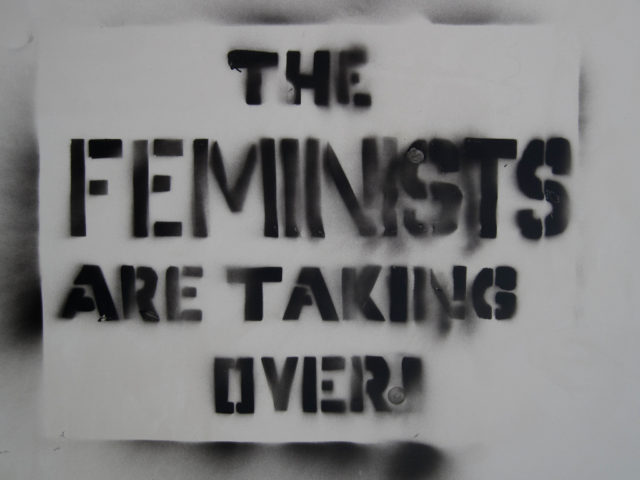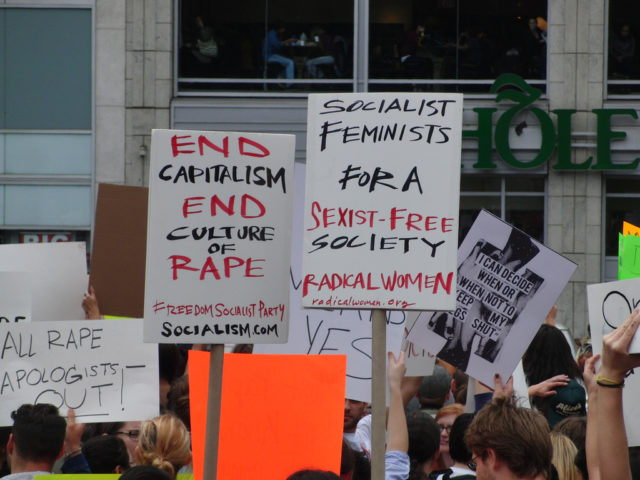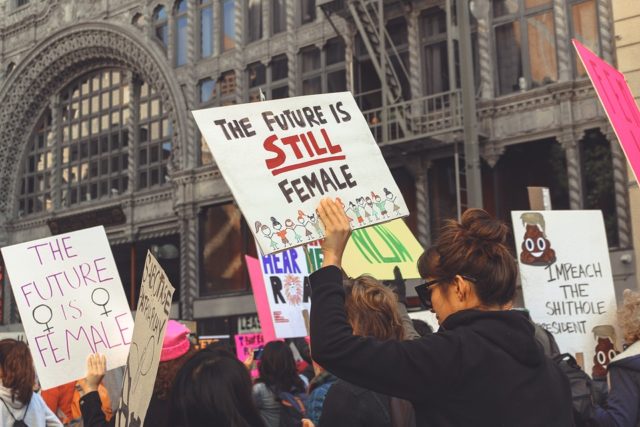An interview with the author of Why Am I Not a Feminist?, the American activist Jessa Crispin
After the biggest scandal to ever hit show business, the one that started with complaints of harassment against Weinstein and then spread throughout the world, at different levels and at different intensities, the feminist movement has experienced a strange moment. On the one hand, thanks to the activism of some intellectuals and large street movements, it seems to have strengthened, on the other, if we have to look at how the protest spread on social networks and in international public opinion, that same movement, gained weight in the ranks and standardized in content, it seems instead to have lost a true radical and revolutionary energy along the way.
In this context, a few months ago the Sur publishing house published a very interesting book entitled Why am I not a feminist? , written by the activist Jessa Crispin , a decidedly interesting character, truly radical, whose work, in addition to giving voice to a position that could be uncomfortable for mainstream feminism, has a phenomenal and truly revolutionary ideological power.
“The basic idea of feminism is to improve the condition of women in general,” she begins to tell me to answer a first, generic question about what she means by feminism and what the problems of the movement are in recent years. She speaks quickly, but fragmented, as if she continues to think in the meantime. “But the problem with this new wave of feminism,” she continues after one of those strangled pauses, “is that the definition of her as a woman seems a little too narrow to me.”
What does it mean? What is their definition of women?
Their definition of women is very simple: they intend to refer only to women who are able to improve their status in life, who can think of themselves as independent, who are ambitious and so on. It is clear that this definition leaves out the poorest women, migrant women, women who do not have access to social media and so on. The latter are almost completely marginalized from feminist discourse.
Why this closure?
Because they tend not to understand that feminist discourse concerns everyone. And I believe it almost all depends on ego and individualism. So, going back to what I think, my definition of feminism is that there is no feminism until we talk about the situation of all women, and when we do we will realize that worrying about the condition and emancipation of all women means considering the condition of every person in the world. We certainly cannot think of improving the condition of women without improving the condition of everyone.
From your speech emerges a feminism that is very different from that of the beginning, at the time of the sufragettes, for example. At what point did it change?
I think it all started with the so-called second wave, it was there that we witnessed the definitive break between a radical part and a more mainstream one, I’m thinking for example of the versions of Betty Friedan or Gloria Steinem, who mainly dealt with work. You know, Betty Friedan’s influence on feminism has been gigantic, but nevertheless I don’t feel like there’s any insight in any of her work.
Can you explain me better?
She started from the consideration that most women in her time were oppressed because they were bored, because they had nothing to do and because they were forced into the role of housewives and mothers, but she knew nothing else. In the sense, she was her condition: she was a wife to a mother and she was bored. She wasn’t allowed to work, or at least they didn’t encourage her to. For this reason she began to fight to ensure that she could use her skills and have a social life, which are two of the main focuses of a feminism that has deteriorated over the years, one that is based on the belief that if I improve my life then I am also improving the lives of others.
But it doesn’t work that way, right?
No, obviously not. Because it is just another capitalism, another patriarchy that brings us a world that we already have before our eyes. It’s not a revolution, it’s just envy.

© Flickr
Does this dynamic have anything to do with a sort of massification of feminism?
Yes, it has something to do with it, of course. But the idea that there can be a universal version of feminism and that everyone should and can be a feminist is something quite new. If everyone were feminists it would mean that feminism would have no meaning. Because many people, including many women, benefit from the way the world is. So, even if they understand very well that it is unfair, they don’t have the slightest desire to change because they know that any change could jeopardize their position too. As long as they manage to live in this system, they will do nothing to dismantle it. I don’t think there is much empathy in contemporary feminism. I think it’s too focused on ego, on individualism, on succeeding in a capitalist world rather than changing it, on taking the place of patriarchy rather than dismantling it.
The parameters of feminism are therefore still those of patriarchy, success, money and power, why? And what are the parameters to follow?
I believe the main reason is the fact that, for the most part, contemporary feminism has never attempted to disengage from the metrics of Success, Power and Wealth. There is a lot of rhetoric about these aspects. For example, I happened to read a horrible essay by an American lady who seemed to have suddenly realized that the world is unfair, as if she had been unfair for a couple of days. This girl wrote her totally careerist version of sexism and at a certain point she brayed and whined stuff like “we need to break down the patriarchy”, but without providing any structural explanation on how sexism and the imbalance of power works in the world of art and literature . The point seemed to be that she couldn’t succeed. And so her version of destroying patriarchy simply boils down to allowing women to have more power. But nothing would be solved that way.
So, they come back to the question, why does feminism use the same metrics as patriarchy?
Because that’s what women, or at least most of them, want. They don’t want the destruction of hierarchies, they don’t want a new balance of power: I want to be successful. They have seen for centuries men make money, take power and be successful, and now, instead of having understood that success, money and power are the elements to fight, they want the same thing.
What would be the right metrics?
I don’t know, things that have to do with whether people are happy or not, whether they are healthy or not, which measure what their quality of life is, what the situation of solidarity and communities is in the world… It is by answering to these types of questions that, for me, a successful feminist revolution can be asked.
So sex is not the heart of the problem, but power is. Should feminism therefore unite with other forms of struggle for emancipation and if so, how?
Yes, I really don’t think we can evolve and carry on a struggle without a deep understanding that the struggle must be generalized. At the point we are at, I believe that women have enough power: they lead some of the most important countries in the world, manage gigantic companies and so on. Perfect parity will necessarily arrive, sooner or later. There are enough open doors in the world to achieve so-called “gender equality”, but the problem is that that will not be enough to make the world a better place. Therefore, if we do not want to limit ourselves to recreating this world of injustices, we must understand that it does not only concern us, that it does not only concern white, educated, Western women. We have to understand this, unless we want to settle for living in a world where we are all increasingly assholes, which is something that sometimes makes me think when reading what many people write on Twitter or Facebook. If instead we want to start thinking about why so many women have remained outside of the new feminist movements, then we must think about how and why their situation has not changed one iota in recent years, and also about the fact that fighting to improve their condition is ultimately equivalent to fighting for the good of all, because it is clear that we are all suffering from the game of one system.

© Flickr
How can we continue to advance a radical idea in this time of populism?
I believe the reason populism has occupied some of the radical positions is because the radicals have abandoned them. There hasn’t been a visionary, organized left for decades. What there was was reduced to weak positions and rents of power and I believe this is an experience that we all share in the contemporary Western world. For example, I was talking to a Polish journalist who told me about her political activity and explained how most of the left in Poland is led by men who have been accused of harassment: they march for the right to abortion, but then they harass women in their political groups. This is the level of hypocrisy.
How do we get out of this?
I don’t know what can be done until the left comes to terms with this. Just as I don’t know how the left will be able to move forward if it doesn’t realize that it’s not just about women’s rights, or just those of trans people, or just those of refugees, but about everyone’s rights. We need to put this first. But then you hear that this story of the Polish journalist also happens in the United States, in Canada, and throughout the Western world, a world in which the left is increasingly broken: a hypocritical left that is more interested in maintaining power than in change the world for real.
How can we really change the situation?
Well, kicking them out, kicking them all out. I was also thinking about it when I was talking to the Polish journalist about how we can fix all this. And you know, the only real solution is to do purges. Not like the ones Stalin made, eh? Just remove these characters from power somehow.
But would everything change if we put women in place of those shitty men?
I don’t know, actually women could be just as much of an asshole as men, so I don’t know how it’s supposed to work. I imagine that there must be someone capable of having a visionary thought – a person, or a group of people – and that when people listen to them and share what they think they can follow them, slowly changing the world together. The problem though is that I don’t see many visionaries on the left, I just see a lot of people quoting Marx out of turn in situations that don’t require it at all, but sorry, I’m not going to get into a discussion about Marx…
Which political figures do you trust? Hello beautiful?
No politicians, there aren’t any. But there are writers or activists, the first name that comes to mind is Chelsea Manning, for example, who has gone through real hell but continues to resist and fight. Or the survivors of the Parkland shootings, anti-gun activists who are just teenagers, but are incredible. The problem is, in general, that we need too much for some leader to come and tell us exactly what we have to do and how we have to behave, so that we have no responsibility.

© Flickr
What role did the Obama presidency have in this dynamic?
I believe that the American left literally disintegrated under the Obama presidency, precisely because he took care of it, he took care of everything, even if in the meantime the drone bombings, the mass deportations, the troubles on Wall Street, the persecution continued of whistleblowers and so on. In short, American politics hasn’t actually changed much. Indeed, there is a great line of continuity between George W. Bush, Barack Obama and Donald Trump.
So Trump isn’t an anomaly?
People pretend that he is, but he isn’t. It’s just a progression along the same lines as what was happening before. This is why it was inevitable. And so yes, I believe that part of the fault of all this is the laziness of the left, which limited itself to putting one person in charge of everything and leaving him all the power, while we could limit ourselves to tweeting some bullshit or writing our little thoughts on Facebook without actually doing anything to change things.
How can we change course, if not immediately, then at least in the coming decades?
I believe that it is as you say, it will take at least a century to get out of it, because we women and men these days do not like to sacrifice ourselves at all for a future that we can only imagine, it is a dynamic that is also understandable within the path of secularization of our lives. By ceasing to believe the false promises of religions of better conditions after this life, we now want heaven to be in this life and we do not want to postpone anything to a future that we do not even know if it will exist. This is why we have lost the idea of sacrifice.



